|
7 Canterbury Road
Uphill 
Hawkinge
01303 892268
https://www.whitehorsehawkinge.co.uk/
https://whatpub.com/white-horse-inn
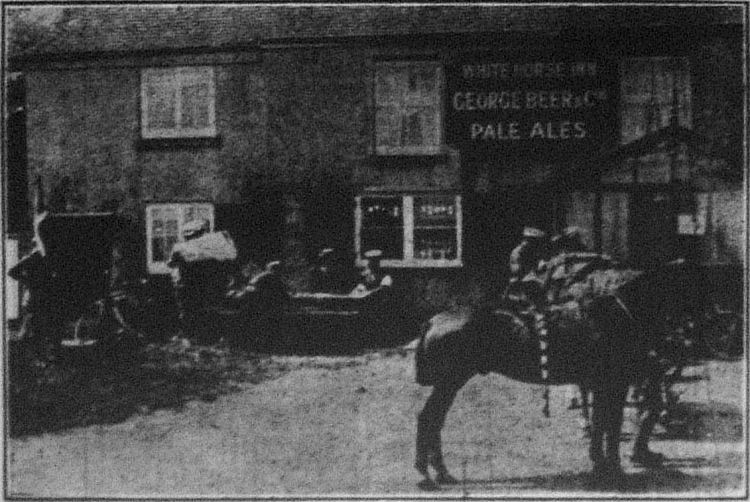
Above photo taken from the Dover Express, 5 August, 1910, showing a
military exercise that took place.
The invading general at Hawkinge makes his headquarters at the White
Horse. The standard of the invaders, blue and white cross, is stuck in
the ground.
|
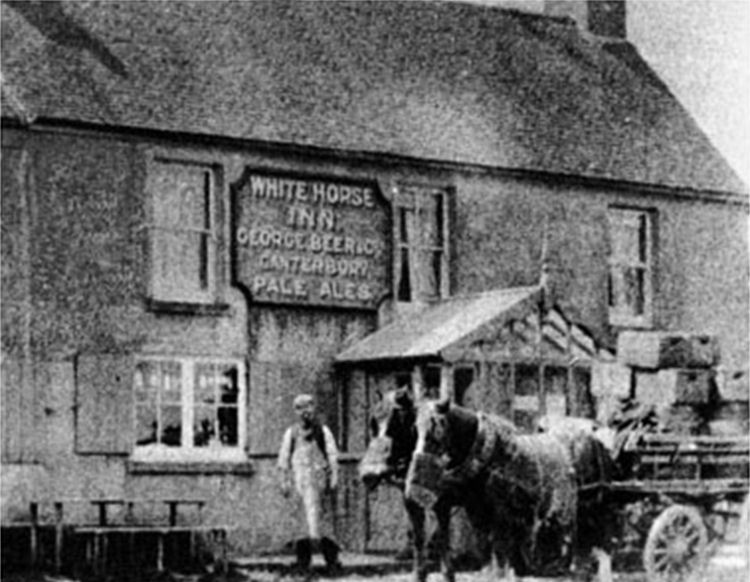
Above photo, date unknown. |
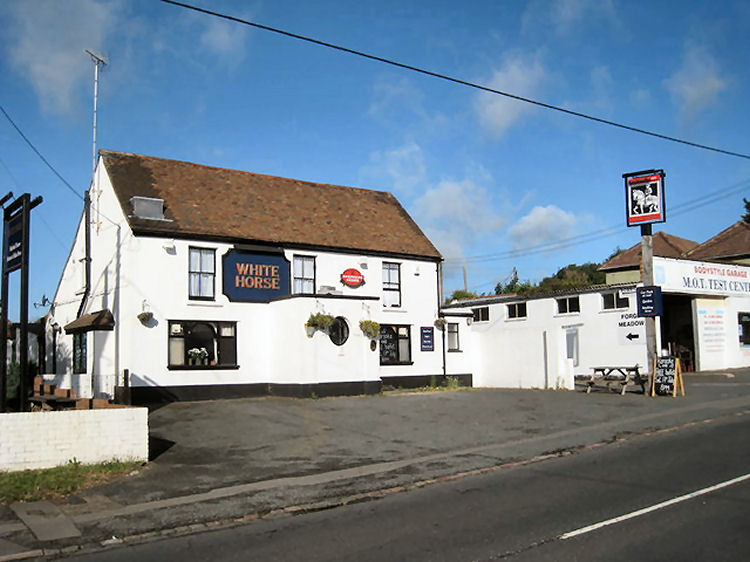
Above photo 2010 by Oast House Archives
Creative Commons Licence. |
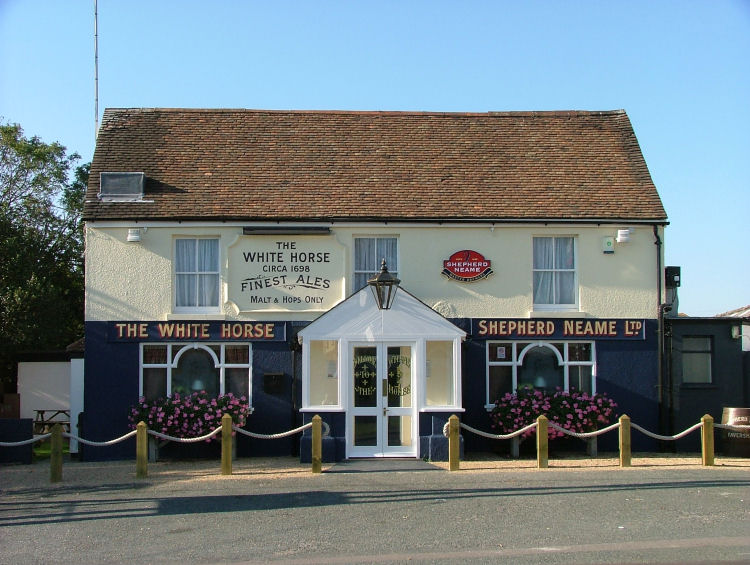
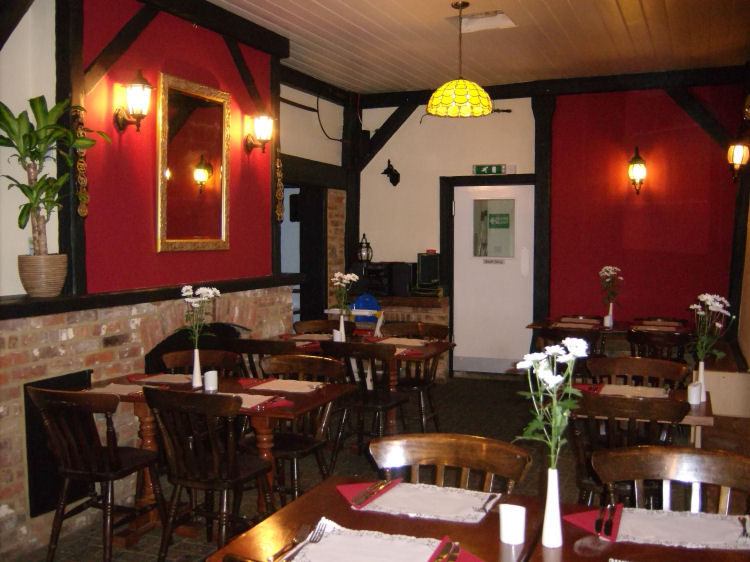
Above photos by kind permission of the "White Horse" and the dining
room July 2009. |
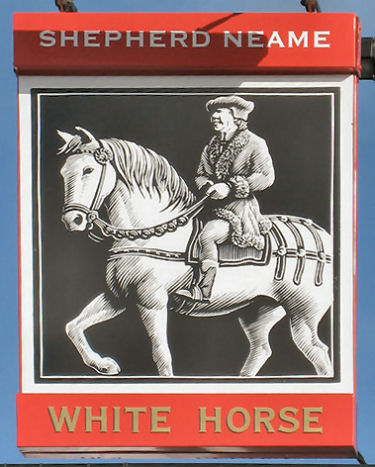
Above sign 2010. |
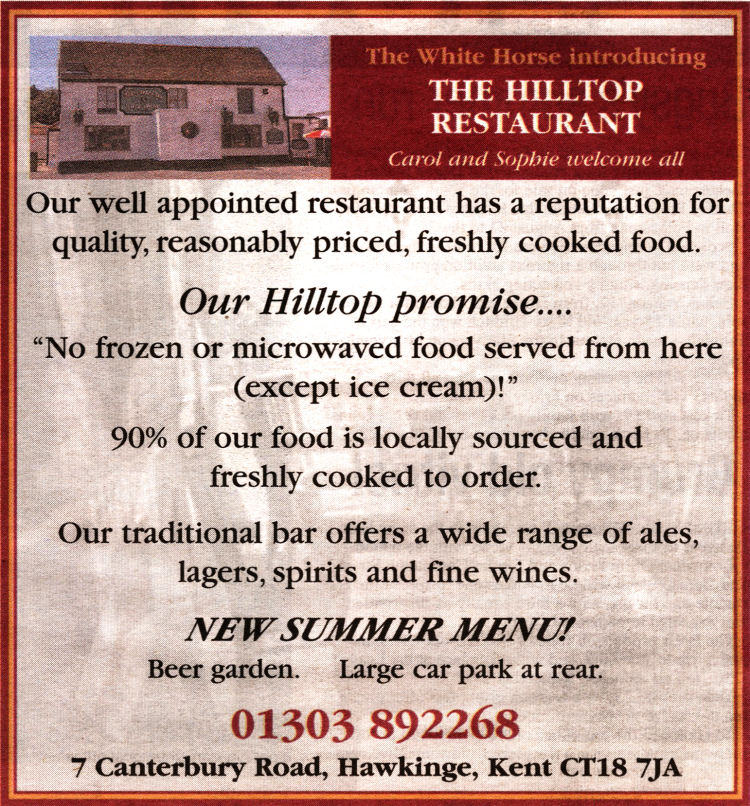 |
|
Above picture shows an advert that appeared in the Dover Express 5 July 2007. |
The first mention of an Inn at Uphill (now Hawkinge) is on a map dated about
1698.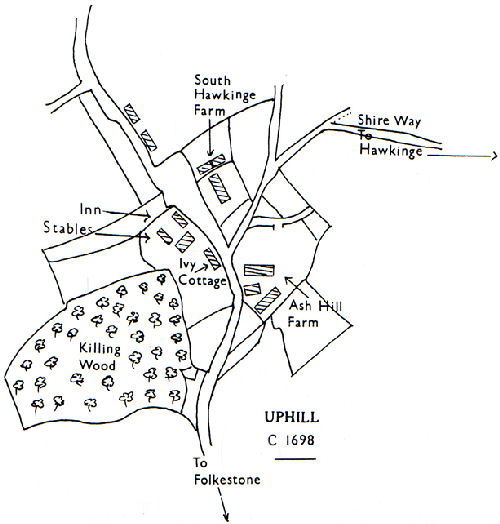 This year is synonymous with the founding year of the Shepherd Neame brewery in
Faversham so there is reasonable although as yet untested assumption that the
"White Horse Inn" is one of the founding Inns of Britain's oldest brewer!
This year is synonymous with the founding year of the Shepherd Neame brewery in
Faversham so there is reasonable although as yet untested assumption that the
"White Horse Inn" is one of the founding Inns of Britain's oldest brewer!
Uphill was the name of the area before it became Hawkinge and it was probably
named because of the steep slope on the road between Folkestone and Canterbury.
The next mention found is of a John Mummery who died 'intestate' about 1785 and
who was described as a victualler; it is believed that he lived and served at
the Inn.
In 1802, the Landlord was a Mr Henry Barber; then a sale brochure dated 31st
August 1819, and pursuant to the bankruptcy of Mathew W Sankey (Brewer), lists
and describes the Inn as:- LOT No. 22. A newly built messuage called the "White
Horse," with stables, at Uphill near South Hawkinge, late in occupation of John
Kember (Landlord.)
|
Kentish Gazette 14 September 1802.
On Thursday last was married at Folkestone, by the Rev. Mr, Timms,
Mr. John Dale, cordwainer, to Miss Mary Barber, daughter of Mr.
Henry Barber, master of the "White Horse" public house at Uphill,
Folkestone.
|
|
From the Kentish Weekly Post or Canterbury Journal 7 September 1819.
VALUABLE BREWERY,
Free Public Houses and other estates,
To be Sold By Auction, By Messrs. White, (Without Reserve).
Pursuant to certain orders of the Vice Chancellor of Great Britain, and
before the Major part of the Commissioners named and authorised in and
by a Commission of bankrupt awarded and issued against Matthew William
Sankey, of the City of Canterbury, brewer, dealer and chapman, at the
Guildhall, of the said city of Canterbury, on Wednesday next, the 22nd
day of September next, at eleven o'clock in the forenoon, (subject to
such conditions of sale as shall be then and there produced.)
The following very Valuable Freehold Estates, in Lots.
Valuable Brewery free public houses and other Estates to be sold by
auction by Mrs white without reserve. Lot 22. A new built Messuage, called the "White Horse," stable, yard,
garden-ground and premises, with appurtenances, situate at Uphill,
Folkestone aforesaid, at or near a certain place called South Hawkinge,
and late in the occupation of Henry Barber, and now in the occupation of
John Kember. |
|
Kent Herald, 27 January 1825.
To be Sold by Private Contract.
All that desirable Freehold Public House, called the "White Horse," with a New
Built Cottage adjoining, Stable, Yard, Garden, and Appurtenances, situate at
Uphill, Folkestone, in the County of Kent, at or near a place called South
Hawkinge, and now in the occupation of John Matcham.
For particulars enquire of Mr. Baker, Folkestone, or of Messers. Plummer,
Solicitors, Canterbury.
|
|
From the Kentish Gazette, 27 October 1857.
SECOND COURT.
In consequence of the number of cases to be heard, a second Court
was formed at one o’clock, under the presidency of E. Foss, Esq.
J. Dawkins, W. Jordan, W. Hills, T. Hart, J. Tyas, F. Tyas, W.
Ovenden, G. Fisher, Sarah Bramwhite and Elizabeth Holden, were
severally indicted for having, on the night of the 12th instant, and
early on the morning of the 13th, assaulted and severely beaten
Charles Goodchild, a constable belonging to the Kent rural police
force, while on duty at Uphill, near Folkestone.
Mr. Russell conducted the prosecution; the prisoners were undefended
by counsel.
The prisoner entered the Court with his left arm bandaged, and
appeared to he suffering severe bodily pains from the injuries he
had received, he was allowed to sit during the investigation; and,
on being sworn, he stated that he resided at Uphill, near
Folkestone, and that on the evening of Monday, the 12th October,
there was a dance at the "White Horse," at Uphill, and that the
landlord of the public-house applied to him in consequence of
several of the now accused parties being in his house creating a
disturbance by insisting in going into the dancing-room without
paying 6d., the price charged for admission. Witness at that time
was not dressed in his uniform, but he went to the "White Horse" and
saw several of the accused and expostulated with them. He warned
them of the consequences that would follow if they created a
disturbance. Those of the prisoners to whom he spoke then left the
dancing-room, and went down stairs into the tap-room. There was
considerable noise made by them throughout the evening, and late at
night there was a fight among them on the road opposite the
public-house. Witness occasionally interfered in endeavouring to
prevent the disturbance, but did not attempt to take any one into
custody. When the time arrived for witness to perambulate his beat
he was proceeding on his duty in the direction of the turn-pike,
about a mile from the town of Folkestone, and when he had reached
within about sixty yards of the end of the beat, some person struck
him a heavy blow with a stick, and he fell to the ground. The night
was very dark; he saw no one, but heard the footsteps of persons
running. Witness got up and pursued his course to his "conference
point" at the turnpike, when by arrangement in his duty he expected
to meet George Ongley, a fellow-constable. On arriving at this place
he saw his fellow officer talking to some men, who were asking him (Ongley)
to let them light their pipes from his lantern, and by the light he
(witness) saw they were the same men with whom he had been in
contact at the "White Horse." Witness said to Ongley, "Do not give
those fellows a light, as some of them have waylaid me and assaulted
me on my beat." Several of the party, who had sticks in their hand,
then attacked him. He defended himself as well as he could, but he
was struck down by them, his hat beaten in, his clothes torn, and
his person much injured. Witness identified several of the prisoners
as having struck him; and with respect to the two women, he said
that they as well as some of the male prisoners threw stones at him,
one of which cut open his head. The prisoners then left him, and he
was assisted home by Ongley. He has been under Mr. Kelcey, surgeon,
ever since, but is now recovering from the effects of the treatment
he experienced from the hands of the accused.
This evidence was corroborated by George Ongley and Robert Swain.
Mr. W. Kelcey, surgeon, at Folkestone, attended the prosecutor
immediately on being sent for, and found him in a state of great
nervous irritation. On examining the parts injured, he found a
severe contusion of the left arm, and a contused wound on the head;
and severe blows had been given over the shoulders, breast, and
back. On further examination of other parts of the body, on a
subsequent day (the 14th), he found that prosecutor had been
severely injured across the loins. He spit and otherwise voided
blood, showing that his system had been much injured by the blows he
had received; and though now he was convalescent for some few days,
the consequences were of a dangerous character.
The prisoners, on being each severally called on for their defence,
denied in general terms having participated in the outrage, except
Filmer Tyas, who said that Goodchild struck him first, and that all
that had been done was in standing in their own defence.
Mr. Foss recapitulated the evidence to the jury, who after
conferring together for some time, returned a verdict of Guilty
against the whole of the male prisoners, and acquitted the two
women.
Mr. Foss, in passing sentence, observed that it was necessary that
the authorities should make an example of those who interfered with
or assaulted police constables in the execution of their duty. The
present case was one of the most unprovoked and brutal character,
and it was deemed necessary to visit its perpetrators with severe
punishment. He then sentenced Dawkins, Jordan, Hart, J. Tyas, F.
Tyas, and Ovenden to 12 months’ imprisonment, with hard labour;
Fisher to nine months, and Hill to six months; and, in discharging
the women, cautioned them as to their future course of life.
|
|
Kentish Express 29 December 1866
Hythe County Petty Sessions, Thursday: Before The Rev. E. Biron, Thomas
Denne and J.J. Lonsdale Esqs., the Rev. F. Wrench, and Capt. Kirkpatrick.
Light measures: Charlotte Mills, Folkestone, innkeeper, unjust half pint
measure. Fined 2s. 6d. and 11s. costs. There was another charge against
the defendant of using a half pint earthenware jug, but the Bench
dismissed it.
|
|
Southeastern Gazette 1 January 1867
Hythe County Petty Sessions, Thursday: Before the Rev. E. Biron, Thomas
Denne Esq., J.J. Lonsdale Esq., the Rev. F. Wrench and Captain
Kirkpatrick
Charlotte Mills, Folkestone, innkeeper, unjust half pint measure. Fined
2s. 6d. and 11s. costs. There was another charge against the defendant
of using a half pint earthenware mug, but the Bench dismissed it.
|
|
From the Dover Express and East Kent News, Friday, 6 March, 1874. Price 1d.
IN LIQUIDATION, DOVER, KENT
Important sale of an old-established and well-arranged BREWERY, together
with 13 Freehold and Leasehold Public and Beer-houses, a Private
Residence, Malt-house, Stabling, &c.
WORSFOLD, HAYWARD, & Co. Have received instructions from the Trusteee of the Estate of Mr. G. S.
Page (in liquidation by arrangement, in connection with the Mortgagees,
to Sell by Auction, at the “Royal Oak Hotel,” Dover, on Tuesday, 24th
March, 1874, at three o'clock precisely, in one or right lots, the
following important and Valuable Property.
LOT 4.
A valuable Frehold Roadside Public-house, known as the “White Horse,”
Uphill. Situate about 2 miles from Folkestone, on the Canterbury Road.
|
|
From the Dover Express and East Kent News, Friday 2 September, 1881. 1d.
WEST CLIFF BREWERY SALE
The freehold roadside public-house, the “White Horse, in the hamlet of
Uphill, was bought by Messrs Kingsford bros. for £870.
|
|
Folkestone, Hythe, Sandgate & Cheriton Herald, Saturday 30 September 1911.
Sequel to an Accident.
Albert Bridges, junior, v. the Mayor, burgesses, etc., of Folkestone.
Claim for £10 10s. for damages for negligence.
Mr. M. F. Blake appeared for the plaintiff, and Mr. R. W. C. Turner
(London) for the Corporation.
Mr. Blake said that the claim was made by the son of the licensee of the
"White Horse," Hawkinge, and was for damages sustained through the
negligence of the defendants or their servants in leaving a road
opposite Walton Farm, on the Canterbury Road, in a dangerous condition.
An obstruction was caused by a heap of stones being left in the road,
and this resulted in the plaintiff being thrown from his machine and
sustaining injuries to himself and damages to his machine.
Albert Bridges stated that he lived with his father at the "White Horse
Inn." On Sunday evening, May 20th, he was cycling to Folkestone. He had
proceeded as far as Walton Farm when he fell from his machine. He was
riding at about 7 miles an hour. He passed a wagon that opposite the New
Road. It was on the left-hand side of the road. It was just getting dusk
at the time; it was about 8:30 p.m. He noticed nothing in front of him
as he was riding down, and saw no lights further down the road. After
passing the wagonette he turned to the left side of the highway, and was
thrown from his machine. On getting up he looked at the stones in the
road. They stood up about six inches above the level of the road, and
they extended right across from Walton Farm to the other kerb. He did
not feel any pain until he was returning home, when he was assisted back
by a young fellow. His machine was badly damaged, the brakes, crank, and
wheel suffering considerably. He cut his coat across the arm, and slit
the jacket. He was unable to wear the suit again on Sundays. He was
bruised right down the arm, and had marks on his hand still. On arriving
home he bathed himself with warm water, and about an hour afterwards his
father drove him down to Dr. Barrett. On the way his father looked at
the stones and pick some up. He produced a very fair sample of the
stones on the road at the time.
His Honour:- They belong to the Corporation.
Mr. Turner:- We will have to have a counter claim. I am not sure this is
not a criminal offence.
Mr. Blake:- I was expecting something of this kind.
Witness, continuing, said that the damage to the machine took about £2
off its value. It was practically a new machine. It was repaired about a
month afterwards, and cost 10s. He made a claim for £2 5s. In repect of
his suit of clothes, which he could not wear again on Sundays. He was
laid up for three weeks. His father paid him 16s. per week, and he put
in a claim for £2 8s. on that account.
Cross-examined by Mr. Turner, witness stated that he saw the doctor 8
times. He could not use his arm for a week after, but he used it three
weeks later. With regard to the suit, he bought it 6 months before the
accident. He paid 35s. For it when it was new.
Mr. Turner:- And yet you claim £2 5s.
Witness, continuing, stated that he had had no medicine or lotion, but
ointment to put on his arm. It was not lighting up time. Witness's
bicycle had two breaks, and he was riding at a "decent rate." Right
across the road, opposite Walton Farm, there was a range of stones, 6
inches high, and three or four feet wide. There was a manhole, and
stones were round the same. Witness denied that the stone had been
rolled down.
Mr. Albert William Bridges said that he was the father of the plaintiff,
After his son came home he drove him to Folkestone, to the doctor. As he
drove back, he examined the stones, and picked a few up. He could have
filled his cart with them. They were six inches high, and in his opinion
they had never been rolled in.
Cross-examined by Mr. Turner:- The Stones were not right across the
road, but 20 feet from kerb to the manhole in the middle of the road.
Mr. Hedley Baring said that he resided at Hawkinge. On the day in
question he was going to Folkestone, and noticed that outside Walton
Farm a portion of the road had been opened up. The stones were not a
great height at the side, but they were 6 inches high in the centre.
William Clark said that he was a carter, and on the day in question he
was up at Walton Farm. He saw that the road had been taken up, and it
had never been rolled. The stone were piled up in the middle of the road
where, he should think they were five or six inches above the surface.
When he was returning home plaintiff passed him higher up the road. He
was going in the same direction as witness, and was riding at quite an
ordinary paste. It was not lighting up time. Witness saw the plaintive
thrown off his cycle.
Cross-examined by Mr. Turner witness said that he was 30 or 40 yards
away from the plaintiff when the latter was thrown.
Question by his Honour, witness said that it would have been possible to
see the stones 30 or 40 yards away.
Mr. Charles Skinner, licensee of the "Wellington," Beach Street, said he
was in company with the last witness on the Sunday in question. He saw
the stones opposite Walton Farm. He should say that they extended
halfway across the road. They had not been rolled in. Plaintiff passed
witness on a cycle as he was returning, and he saw plaintiff fall.
A young man named Godden said that he assisted the plaintiff on the
night in question. He saw the stones in the road previous to the night
of the accident. He rode down on a cycle about 5 minutes after the
accident to the plaintiff. He should say that the stones were five or
six inches high, extending from the curb to the center, and also down
the centre of the road. He saw the plaintiff's cycle, which was badly
damaged. Witness was warned before we got to the stones, so that he was
able to get off in time.
Dr. Barrett stated that he attended plaintiff, who had a puncture wound
in the elbow, and was badly bruised on the shoulder and arm. He was
unable to do this work for three weeks. He attended the plaintive about
10 times, and his charges amounted to £2 6s.
For the defence, George Thomas Sharpe said that he remembered the sewer
being repaired near Walton Farm. He was at the farm on the last Sunday
in May. He motored up there, but did not notice anything extraordinary
about the road. It was up, but did not think there were stones of the
size of those produced on the road. He would have noticed it had the
stones proved an obstruction to traffic.
Albert Hughes, of 43, Princes Street, said that he was foreman in the
employ of the Corporation. He was in charge of the work of laying the
sewers near Walton Farm. It was finished on Thursday, 25th May. The
cross trenches were 10 feet long, and the trench down the middle was 12
feet long. He should say that the stones (produced) were foundation
stones. Above those there would be 4 inches of fine stone. The trenches
were rolled on Thursday, 25th May, and the work was practically finished
on that day. On the Friday, the 26th, the road was rolled down within an
inch of the surface of the road.
George Philpott, 4, Ernwell Road, a Corporation employee, said that the
steamroller was at work on the cross trenches and the middle trench on
the Wednesday and Thursday, 24th and 25th May. On the Friday they were
no stones about, nor on the Saturday. He went on the Monday after the
accident and found that the road had been skidded up. The skid had not
got down as far as the foundation stones. On the Monday morning there
was not a pile of stones on the road 6 inches high, and of the size of
those produced. Witness stated emphatically that the stones were not
lying about on the road on the Saturday.
Questioned by his Honour, witness said that the work was not quite
finished on Saturday. The road had to be wetted again and rolled on the
Monday, but it was fit for use.
William Mills, 86, Blackbull Road, driver for the Corporation, said
that he rolled the road opposite Walton Farm on the Thursday before
dinner. They had rolled the top binding. It was the practice after three
or four days to wet the road and roll it. The hole in the road was quite
close to the manhole. It looked as if it had been pulled up by a skid.
The road was finished for traffic when they left on Thursday.
Stephen Binfield, a Corporation employee, corroborated Mills' evidence.
His Honour stopped the case at this juncture and pointed out that even
assuming that the evidence of the plaintiff was correct, and that a
ridge of stone six inches high did extend across the principal part of
the road, the plaintiff, according to the evidence, was able to see the
stones from a distance of about 40 yards. Assuming that the corporation
had been guilty of negligence of leaving the road in a state dangerous
to the public, still if the plaintiff has exercised reasonable care he
could have averted the accident.
Mr. Blake said that his suggestion was that the plaintiff when about 40
yards off and his eyes concentrated on the lights of another portion of
the road below this particular portion, and thus overlooked this part of
the road.
His Honour pointed out, however, that the plaintiff should have seen
this portion of the road, and that if he went into it he was guilty of
want of care.
Mr. Blake stated that the plaintiff was not riding recklessly.
His Honour said that it was not a question of recklessness, but of the
actual speed of riding. On that point plaintiff's case failed.
Mr. Turner asked for judgement, with costs.
His Honour, however in reply, said that he would simply not suit
plaintive.
|
|
Folkestone, Hythe, Sandgate & Cheriton Herald - Saturday 12 June 1915.
ELHAM COUNTY BENCH. THE WHITE HORSE, HAWKINGE.
The license of the "White Horse," Hawkinge, was temporarily transferred
from Mr. Albert Bridges to Mr. John Thomas Smith.
|
|
Folkestone, Hythe, Sandgate & Cheriton Herald, Saturday 12 June 1924.
Sudden Death of Licensee.
An inquest was held by the East Kent coroner (Mr. Rutley Mowll), at the
"White Horse," Hawkinge, on Friday last, on the body of Charles Henry
Thomas Goss, who died suddenly of the previous Monday.
Caroline Goss gave evidence of identification. She said her husband was
the licensee of the "White Horse," and is age was 52 years. He had
recently complained of pains and stiffness in his legs, which he thought
was rheumatism, but he refused to have a doctor. On Monday, April 7th,
he went into the lodge to saw wood, and about 4:30 p.m. brought in some
blocks of wood. She was upstairs at the time, and she was called down to
speak to the oilman. On going into the kitchen she found her husband
sitting in the a chair. He said he was in pain, and thought he was going
to choke. She sent for a doctor, but her husband died in the kitchen
before he arrived from Folkestone. There was no suggestion that he had
injured himself in sawing wood.
Dr. W. Claude P. Barrett, of Folkestone, said he arrived at the house at
5:30, and the deceased was then dead. At the time he could not say what
was the cause of death, but on making a post-mortem examination he found
the deceased was suffering from fatty degeneration of the heart. There
was no sign of injury. Slight exertion might cause death in such a case.
The jury, of which Mr. Henry Kettle was foreman, returned a verdict of
death from natural causes.
|
|
Folkestone, Hythe, Sandgate & Cheriton Herald 23 August 1930.
CORRECTION.
In our report of the Hawkinge Flower Show, in last week's issue, it was
incorrectly stated that the show was held in Mr. Castle's meadow next to
the "White Lion" Inn, Hawkinge. This should have been the "White Horse"
Inn, Hawkinge, the proprietor of which (Mr. A. E. Fidge), kindly
offered his recreation room for the use of the committee, before and on
the day of the show.
|
|
From the Dover Express, Thursday, 17 April, 2008.
(Advertising feature)
Fresh flavour at White Horse in Hawkinge.
To experience everything a village pub has to offer, visit The White
Horse in Hawkinge.
If you want a meal with a loved one, friends and family, or to watch big
screen sports and play pool, darts or cribbage, it's all available at
this cosy village pub which knowledgeable landlords Andy and Cheryl
Howarth took over in October.
You can eat in the bar and restaurant or the conservatory and enjoy a
wide selection of freshly cooked dishes created from ingredients
provided by local butchers, greengrocers and fishmongers.
These include steak and ale pie, chicken breasts and gammon steaks as
well as vegetarian and fish dishes.
Sunday lunches are a great success, with a choice of one, two or three
courses.
The White Horse caters for sizeable gatherings, whether it's a family
occasion, an office party or a bereavement function.
Opening hours are noon to 11 pm on Tuesday to Saturday, 6pm to 11 pm on
Monday, and noon to 10.30pm on Sunday.
Visit The White Horse at 7 Canterbury Road, Hawkinge, near Folkestone or
call 892268.
|
Just heard today (Oct 2018) that the pub looked to be currently closed
for renovation, we hope.
Latest news, certainly open in 2019.
LICENSEE LIST
BARBER Henry 1802+
KEMBER John 1819+
MILLS James 1841-58+ (age 49 in 1851 ) )

MILLS Edward 1871+ (also carpenter age 22 in 1871 ) )
MILLS Mrs Charlotte 1874+

McHOLDRIDGE/McTOLDRIDGE James 1881-82 (age 47 in 1881 ) )
MAJOR Edwin Dec/1890 dec'd
MAJOR Francis Dec/1890-91+ (widow age 57 in 1891 ) )
BRIDGES William Albert 1899-June/1915 (age 41 in 1901 ) )
 
SMITH John Thomas June/1915+

GOSS Charles Henry Thomas 1918-June/24 dec'd
FIDGE Archibald Edward F 1931-39+ (age 60 in 1939)

HOWARTH Andy Oct/2007-July/09
ADAMSON Barry July/2009-13+
MARTIN Philip to July/2017
JOHNSTON Lee July/2017+
https://pubwiki.co.uk/WhiteHorse.shtml
 From Bagshaw Directory 1847 From Bagshaw Directory 1847
 From the Post Office Directory 1874 From the Post Office Directory 1874
 From
the Kelly's Directory 1899 From
the Kelly's Directory 1899
 From the Kelly's Directory 1903 From the Kelly's Directory 1903
 From
the Kelly's Directory 1934 From
the Kelly's Directory 1934
 Census Census
|







 This year is synonymous with the founding year of the Shepherd Neame brewery in
Faversham so there is reasonable although as yet untested assumption that the
"White Horse Inn" is one of the founding Inns of Britain's oldest brewer!
This year is synonymous with the founding year of the Shepherd Neame brewery in
Faversham so there is reasonable although as yet untested assumption that the
"White Horse Inn" is one of the founding Inns of Britain's oldest brewer!